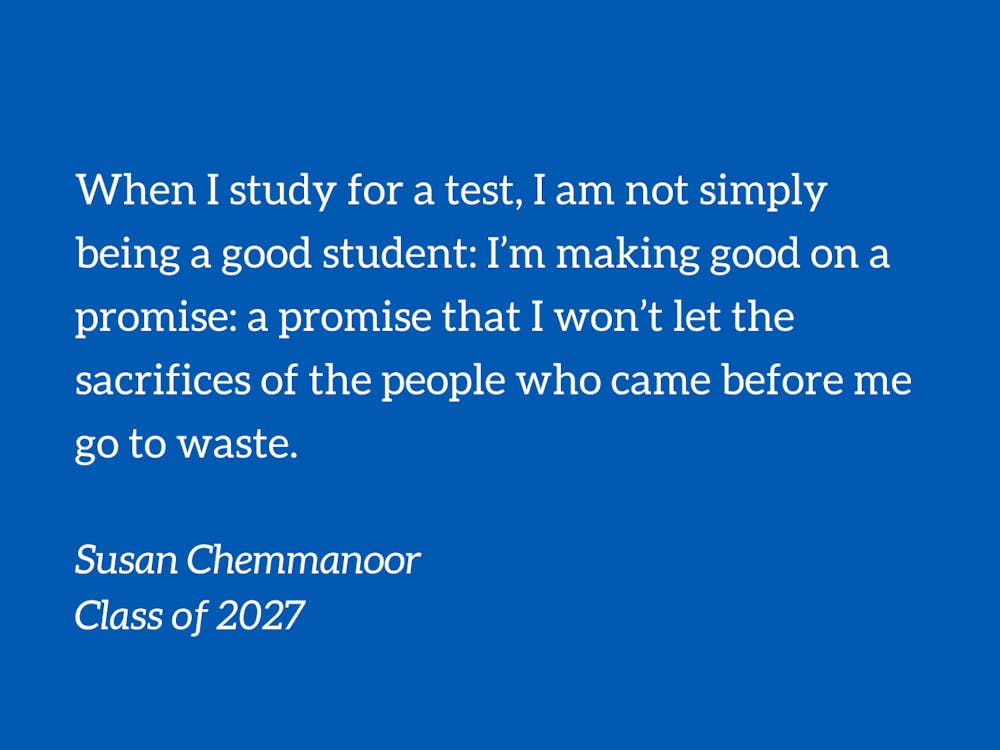I am a child of immigrants. My parents immigrated from India to the U.S. in the late 90’s. I live to make them proud, but I’m okay with that.
This need to repay immigrant parents for their sacrifices is branded as “immigrant guilt”. It’s a feeling of emotional debt that is simply a part of the second-generation immigrant experience. You see, I was indebted to my parents before I even existed. They were making sacrifices for me to live a better life – the American life – before I was conscious. And it’s not something I take lightly. It’s what drives me.
When I study for a test, I am not simply being a good student: I’m making good on a promise, a promise that I won’t let the sacrifices of the people who came before me go to waste. A vow to not let the loneliness and bravery of moving to a new country be futile. An oath that being thousands of miles away from their own parents won’t be for an ungrateful daughter.
They gave me the chance at a better future, and now I have to make it a reality.
I know it sounds dramatic, but it’s real. Now, don’t get me wrong, I want to be great for myself and my own values, but I’m mainly driven by a need to recompense my parents.
So, I carry that expectation to be great with me everywhere. I carry the sacrifice of my mother and my father. I carry the toil of my grandparents — the ones in Bangalore apartments that read this column every other week and compliment the big words I like to use (hi appappa and ammamma). I lift the honor of my homeland with my heart so I don’t risk buckling under the weight.
All that baggage fatigues me. There’s no room for rest when you’re convinced you need to pay back an eternal debt. Immigrant guilt forces me to never be complacent but simultaneously makes leisure feel like a crime. The guilt is insidious rather than blatant. It sits disapprovingly in the corner of my mind as I watch TV. It scoffs at the idea of a fun weekend out. It glorifies burnout and justifies sleepless study nights. It completely warps my perception of productivity. Through the lens of immigrant guilt, to be productive means to toil, to suffer and to drown in Google Calendar appointments.
However, it doesn’t have to be that way. I don’t have to suffer to be a grateful daughter. So, recently, I’ve been trying to re-frame how I look at leisure. I’ve been trying to convince myself that rest can also be the foundation for future greatness. As writer Audre Lorde said, “Caring for myself is not self-indulgence, it is self-preservation, and that is an act of political warfare.” Self-care is an epic step in the saga of success. It’s something radical and deeply necessary. It could be the sustenance my body needs to keep pushing — to keep making good on my promise. After all, I can’t save the world if I don’t get enough sleep. I can’t become a doctor without some Gilmore Girls in my life.
Maybe one day my debt will be “paid” off. Maybe one day the immigrant guilt will leave me to watch movies in peace. Until that day, I will continue to wear that guilt like a badge of honor. It signifies something larger than myself. It represents generations of my family who worked to secure a better life for their kin. It captures the heartbreak, the chaos and the courage of moving to a new country. It reminds me of why I’m able to be here at Duke and who I’m trying to make proud.
Susan Chemmanoor is a Trinity first-year. Her column typically runs on alternate Fridays.
Get The Chronicle straight to your inbox
Signup for our weekly newsletter. Cancel at any time.
Susan is a freshman in Trinity. Her columns run on alternate Fridays.

